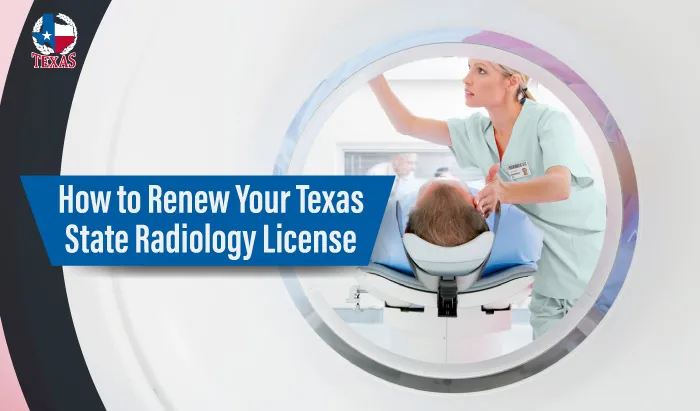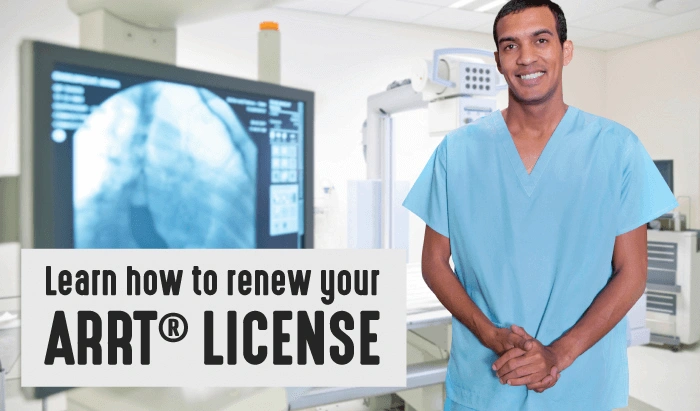Your Texas Radiology License Renewal Guide

Your Texas Radiology License Requirements and MRT Renewal Guide – Radiologic Technologist


Like many other states, Texas has its own unique MRT license renewal and continuing education (CE) radiology requirements, but what sets Texas further apart are the multiple types of state certification an RT can hold, each one having different renewal requirements. This can make it somewhat difficult to understand how to renew a Texas radiology license. We’re here to help.
After reading this detailed yet easy-to-understand guide, you will have a clear understanding of how to renew your Texas radiologic technologist license (and you’ll save yourself some valuable time and money in the process)
Let’s get started.
- There are 3 Levels of License Certification for a Radiologic Technologist in Texas
- Universal Continuing Education Requirements for Renewal
- Difference between “Directly Related” or “Indirectly Related” Subjects
- New CE Requirement for Texas Radiology License Holders
- Live Courses Not Required
- CE Requirements for Different Texas Radiology MRT License Renewal
- License Renewal Process
- Renewal Fees
- Wrapping Up!
There are 3 Levels of License Certification for a Radiologic Technologist in Texas
- General Medical Radiologic Technologist (MRT)
- Limited Medical Radiologic Technologist (LMRT)
- Non-Certified Technician (NCT)
*Note: MD, DO, DC, DPM, RN, PA are not included in the above list.
Universal Continuing Education Requirements for Renewal
Licensees must meet specific continuing education requirements as part of the Texas state radiology license renewal process. MRTs, LMRTs, and NCTs must accrue a certain number of credits by completing continuing education (CE) activities. The subject matter of these CE activities is categorized by the TMB as “Directly Related” or “Indirectly Related.”
Difference between “Directly Related” or “Indirectly Related” Subjects
Directly Related
These are subjects that are related to exposing patients to ionizing radiation and clinical diagnostic radiography. A minimum of 50% of the total CE credits should be from directly related subjects.
Note: While you can complete CE activities related to the application of non-ionizing radiation, these CE credits can make up no more than 50% of your total required credits.
Indirectly Related
Subjects that are not related to radiation, such as personal development, are classified as indirectly related subjects. You may accrue no more than 50% of your required CE credits from indirectly related subjects.
New CE Requirement for Texas Radiology License Holders
MRTs, LMRTs, and NCTs are required (along with many other healthcare professionals) to complete a course in human trafficking prevention approved by the executive commissioner of the Texas Health and Human Services Commission (HHSC). You have to complete this requirement before every renewal as part of your required CE credits.
You can check out approved courses on the HHSC’s Health Care Practitioner Human Trafficking Training page. They have one up now that is free and meets this requirement.
Live Courses Not Required
In-person, instructor-led courses are not required for MRTs, LMRTs, and NCTs at this time.
CE Requirements for Different Texas MRT Radiology License Renewal
- A total of 24 CE credits need to be completed every 2 years
- A minimum of 12 of these credits should be either Category A or Category A+ CE credits and must include the human trafficking prevention course mentioned above
- If you earned extra CE credits, you can roll over a maximum of 48 of them to your next renewal period (except for the human trafficking prevention course—you have to meet that requirement each renewal period)
- If you hold a current and active annual registration or credential card issued by the American Registry of Radiologic Technologists® (ARRT®) that indicates you are in good standing and not on probation, this will satisfy your CE requirement, so long as the CE credits you earned for your ARRT® renewal were completed during your Texas biennial renewal period. This does not include the human trafficking prevention requirement, of course.
- A total of 18 CE credits need to be completed every 2 years
- A minimum of 9 of these credits should be either Category A or Category A+ CE credits
- You can carry over a maximum of 24 extra CE credits to put toward your next renewal period (except for the human trafficking prevention course—you have to meet that requirement each renewal period)
- If you hold a current and active annual registration or credential card issued by the American Registry of Radiologic Technologists® (ARRT®) that indicates you are in good standing and not on probation, this will satisfy your CE requirement, so long as the CE credits you earned for your ARRT® renewal were completed during your Texas biennial renewal period. This does not include the human trafficking prevention requirement, of course.
- A total of 12 CE credits need to be completed every 2 years
- A minimum of 6 of these credits must be either Category A or Category A+ CE credits
- If you earned extra CE credits, you can carry over up to 12 for your next renewal period (except for the human trafficking prevention course—you have to meet that requirement each renewal period)
- A total of 12 CE credits need to be completed every 2 years
- A minimum of 6 of these credits must be either Category A or Category A+ CE credits
- If you earned extra CE credits, you can carry over up to 12 for your next renewal period (except for the human trafficking prevention course—you have to meet that requirement each renewal period)
The CE activities used by a radiologic technologist to complete renewal requirements for any other Texas health profession license can be considered, as well, provided they fulfill the above-mentioned criteria.
ARRT® license renewal credits
The ARRT® license renewal process also requires completing CE credits. You can choose courses in a way that meets both ARRT® and Texas Medical Board specifications.
Reach out to our experts to help you plan CE courses for both your ARRT® and Texas radiology license requirements together – https://www.medical-professionals.com/en/contact-us/
Or, if you’re comfortable in planning for yourself, we recommend our All-Access Pass, which gives you access to unlimited CE credits for both your ARRT® and Texas renewal.
Maintaining records of compliance
As a best practice, you should maintain a record of all your completed CE certificates so that you can provide it as proof in case you are selected for a random audit.
License Renewal Process
Your renewal window opens 60-90 days before your license expiration date. The TMB will mail you a renewal reminder postcard at least 60 days before your license expires. The easiest way to complete your Texas radiology license renewal is online.
- Visit this page https://renewals.tmb.state.tx.us/mrt/login.aspx
- Enter your license number and the last 4 digits of your Social Security Number
- Review and confirm your contact and license information
- Pay the renewal fees online
- Print or make a digital copy of the receipt
Your renewal will be processed in two business days, and then you can download and print your brand new Texas radiology license.
For any issue you may face during the online renewal process, you can contact the Texas Medical Board helpdesk at – registrations@tmb.state.tx.us
Renewal Fees
- The Texas MRT and LMRT license renewal fee is $66 ( $64 agency fees + $2 Office of Patient Protection (OPP) fee)
- For NCT registry renewal, the fee is $56
Wrapping Up!
And that’s it! We hope this guide gave you a clear understanding of the Texas radiology license requirements and renewal process.
Completing your CE credits as part of the renewal process requires major effort from RTs. Based on our experience, we have observed that this often becomes a pain point for RTs who struggle to find online CE courses that are high-quality, genuine, and affordable.
At Medical Professionals, our work is dedicated to the continuing education of RTs. We have supported hundreds of RTs over the years in completing their CE requirements successfully online. Let us support you, too.
Disclaimer: The information provided on this website is intended to provide useful information to radiologic technologists. This information should not replace information provided by state, federal, or professional regulatory and authoritative bodies in the radiological technology industry. While Medical Professionals strives to always provide up-to-date and accurate information, laws, regulations, statutes, rules, and requirements may vary from one state to another and may change. Use of this information is entirely voluntary, and users should always refer to official regulatory bodies before acting on information. Users assume the entire risk as to the results of using the information provided, and in no event shall Medical Professionals be held liable for any direct, consequential, incidental or indirect damages suffered in the course of using the information provided. Medical Professionals hereby disclaims any responsibility for the consequences of any action(s) taken by any user as a result of using the information provided. Users hereby agree not to take action against, or seek to hold, or hold liable, Medical Professionals for the user’s use of the information provided.

